OSCAR WILDE
|
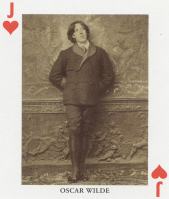
|
Oscar
Fingal O'Flaherty Wills Wilde was born in Dublin on October 16,
1854, as the second son of Sir William and Lady Jane Wilde. Jane's first child, William "Willie"
Charles Kingsbury, was born on September 26, 1852 and a daughter, Isola Emily
Francesca, was delivered on April 2, 1857. Ten years later, however, Emily died
from a sudden fever. Oscar was profoundly affected by the loss of his sister,
and for his lifetime he carried a lock of her hair sealed in a decorated
envelope.
Willie and Oscar attended the Portora Royal School at Enniskillen, where Oscar
excelled at studying the classics, taking top prize his last two years, and also
earning a second prize in drawing. In 1871, Oscar was awarded the Royal School
Scholarship to attend Trinity College in Dublin. Again, he did particularly well
in his classics courses, placing first in his examinations in 1872 and earning
the highest honor the college could bestow on an undergraduate, a Foundation
Scholarship. In 1874, Oscar crowned his successes at Trinity with two final
achievements. He won the college's Berkeley Gold Medal for Greek and was awarded
a Demyship scholarship to Magdalen College in Oxford.
|
During
his college days at Oxford, Wilde became a supporter and leader of the aesthetic
movement. He admired English writers like John Ruskin or painters like the
American James McNeil Whistler and fully embraced the "l'Art pour
l'Art" (Art for Art's sake) principle. After his graduation in 1878 he
began to write plays for the stage and started a tour of lectures on
aesteticisme, first in England in 1879 and 2 years later in the USA and Canada.
That tour lasted about 9 months and everywhere he came his personal aesteticisme
became subject in contraversial disputes.
In
1884 he married Constance Lloyd and they had 2 sons, Cyril and Vyvyan. Besides
his lectures he wrote art-critics for several magazines, like the Pall Mall
Gazette. In 1888 he wrote a collection of fairy tales "The Happy
Prince and Other Tales" and in 1891 his only novel "The Picture of
Dorian Gray" was published as well as a second collection of fairy tales,
"The House of Pomegranates".
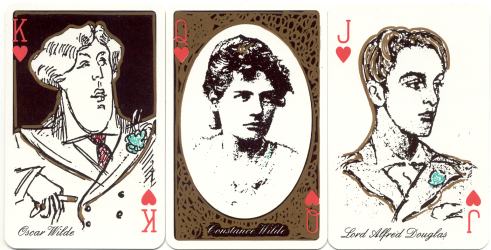
In
that same year he first met Lord Alfred "Bosie" Douglas, son of the Marquis of
Queensberry. Oscar Wilde grew very fond of him and started a relation with Bosie.
The relation ended when Oscar sued Bosie's father for libel as the Marquis had
accused him of homosexuality. Oscar withdrew his case but was himself arrested
and convicted of gross indecency and sentenced to two years hard labor.
Constance took the children to Switzerland and reverted to an old family name,
“Holland.”
He and Bosie reunited briefly, but Oscar mostly spent the last three years of
his life wandering Europe, staying with friends and living in cheap hotels.
Sadly, he was unable to rekindle his creative fires. When a recurrent ear
infection became serious several years later, meningitis set in, and Oscar Wilde
died on November 30, 1900 in France and was burried at the Père-Lachaise
cemetery in Paris.
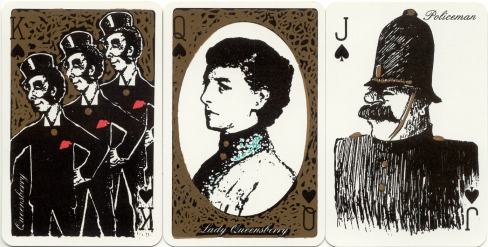
This is the life
that is depicted in this deck. Richard Ellman, Wilde's biographer, has devised
an intricate scheme to condense Wilde into pictorial form, and R. Fanto has made
the withy and unexpected drawings. Three suits are based upon his writings:
Hearts are Instigations, Clubs are Images, Diamonds are Complications. Spades
show main events in his life. Click HERE to see the full
scheme and read the full explanation of all the cards.
CLICK THE ACES TO SEE THE NUMBERCARDS
PER SUIT
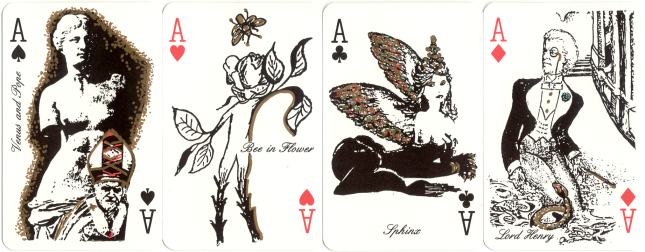
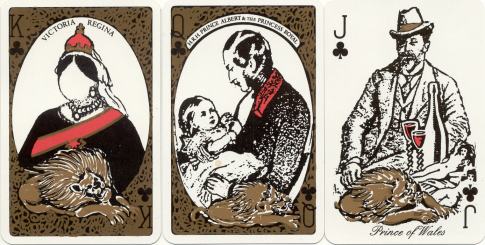
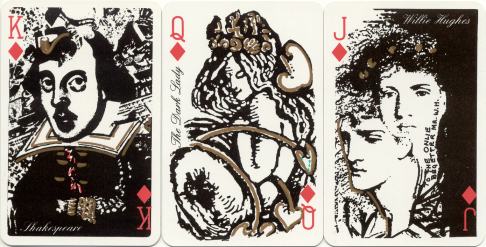
The deck was
printed in France by Grimaud and published by Pressage International in 1986.
The deck consists of 52 cards, 2 jokers, 1 title card, 1
text card and a leaflet.
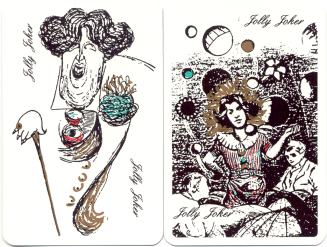
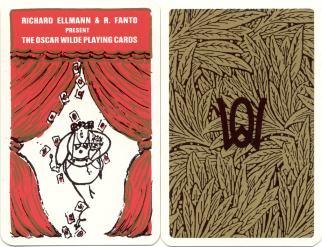
BACK







